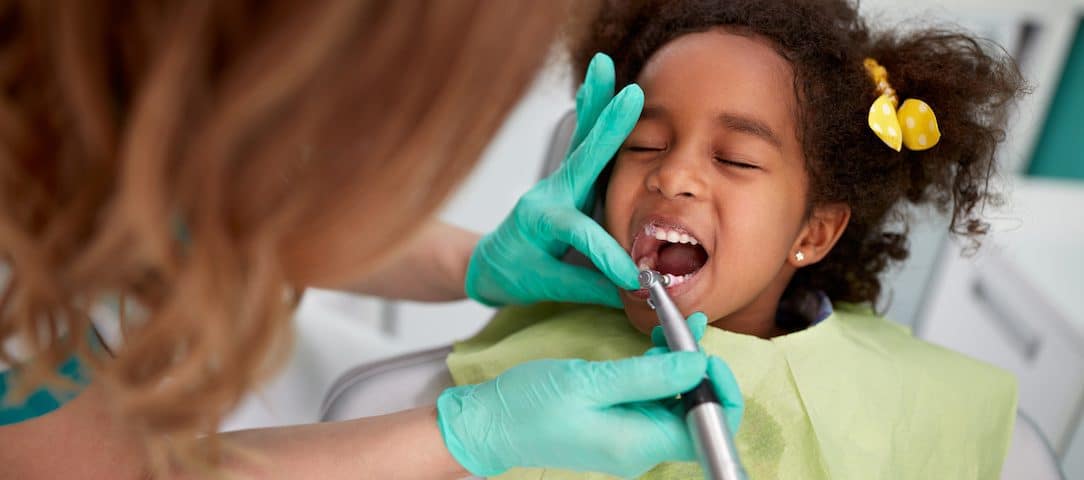Children’s Dental Health Month: 4 Things You Should Know

What’s a Dental Emergency?
February 5, 2020
5 Reasons Your Teen Will Love Invisalign®
February 19, 2020We know you love your children and want to do what’s best for them. A good way to make sure you’re setting your child up with a healthy future is by taking the time to incorporate good oral hygiene practices as soon as they start developing their baby teeth. February is Children’s Dental Health Month, a month set to mark the importance of teaching caregivers and children the importance of caring for their little teeth. Setting a child up with healthy habits will help ensure they have a healthy smile that shines bright for years to come.
From your child’s first dental visit with us to their last day of high school and beyond, we’re here to take care of their smile for life. At home, there are pivotal steps you can take to help keep their mouth happy and healthy.
Practice these 4 tips to support your child’s mouth during Children’s Dental Health Month and beyond:
Encourage Tap Water – the fluoride can do wonders!
Fluoride has a plethora of benefits when it comes to our oral health. Thankfully, we can usually find fluoride in our tap water. The benefits of fluoride in water include:
- It prevents tooth decay: this is one of the best ways to prevent tooth decay, which the ADA says is one of the most common childhood diseases. It’s estimated that 51 million school hours and 164 million work hours are lost each year due to dental problems. Community water fluoridation is so effective at preventing tooth decay that the CDC named it one of the most notable public health achievements during the 20th century.
- It fights cavities: not only does it help with tooth decay, but it can also protect against cavities.
- It’s safe and natural: fluoride in water is a safe way to help your teeth with more than 100 health organizations promoting the health benefits of water for preventing tooth decay. Fluoride is natural occurring in groundwater and oceans, and water fluoridation adjusts the amount to the recommended level for dental health. It’s along the same lines as fortifying other foods with iodine, vitamin D, calcium, folic acid, and more.
- It’s cheap: It’s been said that the average lifetime cost per person to fluoridate water supply is less than a dental filling. The average is $1 invested in fluoridation saves $38 in dental treatments.
Visit the Dentist as Soon as They Get Their First Tooth
When your baby first has a tooth come in, or by the time they turn one, take them to the dentist. They’ll be able to give you recommendations on how to best clean your baby’s mouth and prevent things like baby bottle tooth decay. When you start taking your child at an early age, they’ll get more comfortable with their dentist.
Make Dental Hygiene Fun!
Dental hygiene can seem like a mundane task to your children before they can fully grasp the importance of keeping a clean mouth. When they’re old enough, let your kid pick their toothbrush and the flavor of their toothpaste. This will make them more excited to brush their teeth each time, which means one less argument you have to have with your child.
Provide Them with a Healthy Diet
Your child’s diet plays a big role in their dental health at this age. Avoiding too much sugar in fruit juices and sweet snacks can help prevent cavities. Limit foods that increase tooth decay like hard candies and sweetened drinks like soda and juice. These sweet treats are yummy, but when they cause major dental problems at a young age it’s just not worth it.
Common Dental Problems In Children
We know that sometimes problems happen and can be hard to catch in children. Here is a list of common dental problems in children that you should look out for:
- Tooth decay – this is the most common childhood dental problems. If you notice a sticky film perpetually on your child’s teeth, get to the dentist as soon as able.
- Bad breath – most of the time bad breath comes from foods we just ate, but sometimes it’s caused by bacteria.
- Sensitive teeth – if hot or cold foods bring irritation to your child then they could be suffering from sensitive teeth. Sometimes, it could be a symptom of a deeper issue.
- Thumb-sucking – while this is relatively normal for small children, it’s critical your child stops sucking their thumbs when their permanent teeth come in or deep problems can arise.
- Gum disease – poor dental hygiene can bring along gingivitis. It can progress into a deeper issue if you’re not careful.
- Teeth grinding – this can cause pain in your child’s mouth, though most times a night guard will do the trick.
- Canker sores – these small mouth sores don’t spread from child to child, but they can take a couple weeks to go away. These can be brought on by the foods they’re eating or if they’re filling stressed.
- Baby teeth that won’t get loose – sometimes not all the baby teeth naturally get loose. If your child has a stubborn tooth that won’t get loose, see the dentist.
Bring Your Child to Premier Dentistry of Eagle for Children’s Dental Health Month
We know it can be difficult to find a dentist for your entire family, but Dr. Shane S. Porter and our team are here to take care of your family’s smiles for life. From your child’s first dental we will make sure they’re taken care of for the rest of their life. Call us to book their first appointment during Children’s Dental Health Month: (208)-546-0655.



